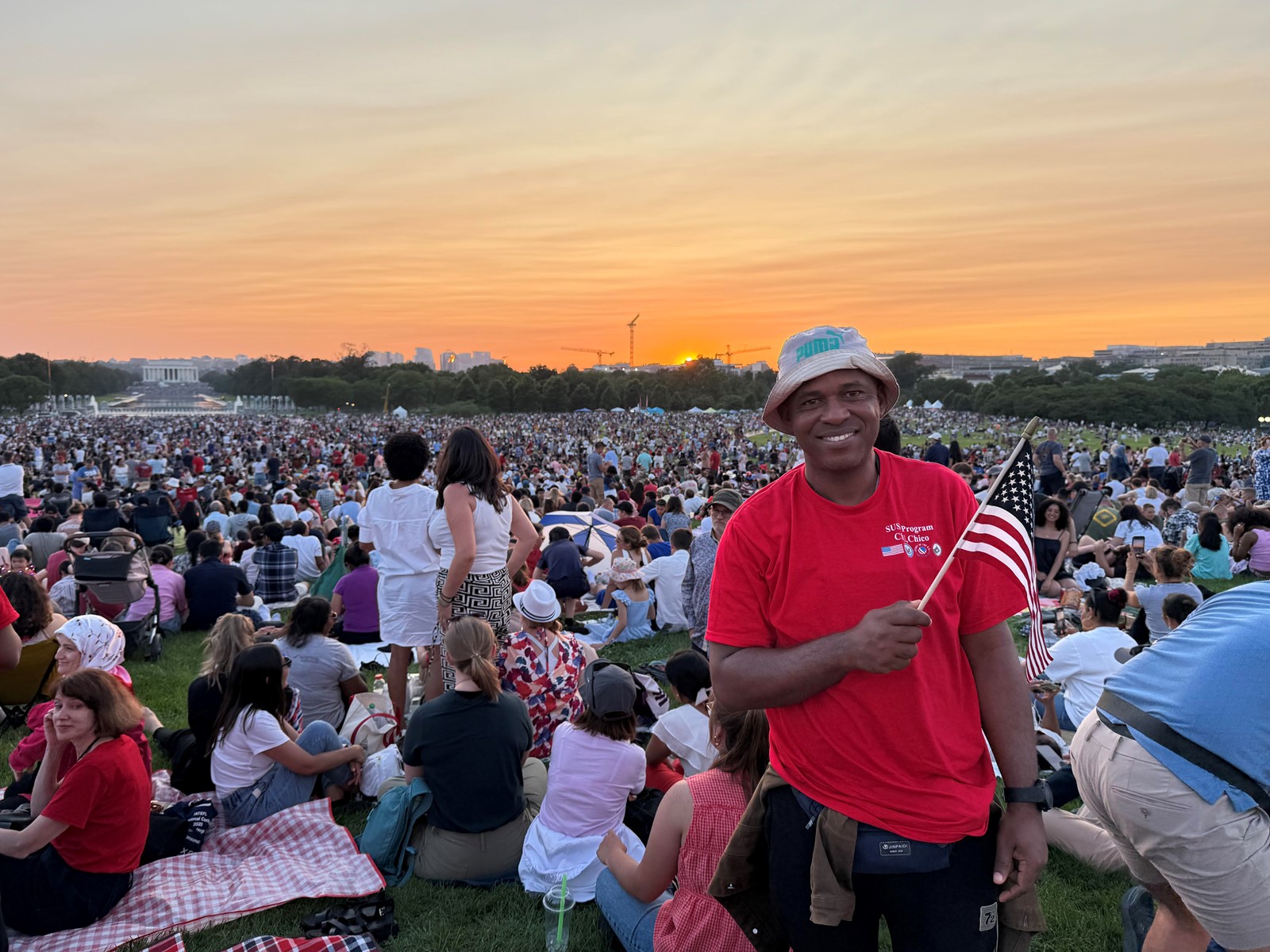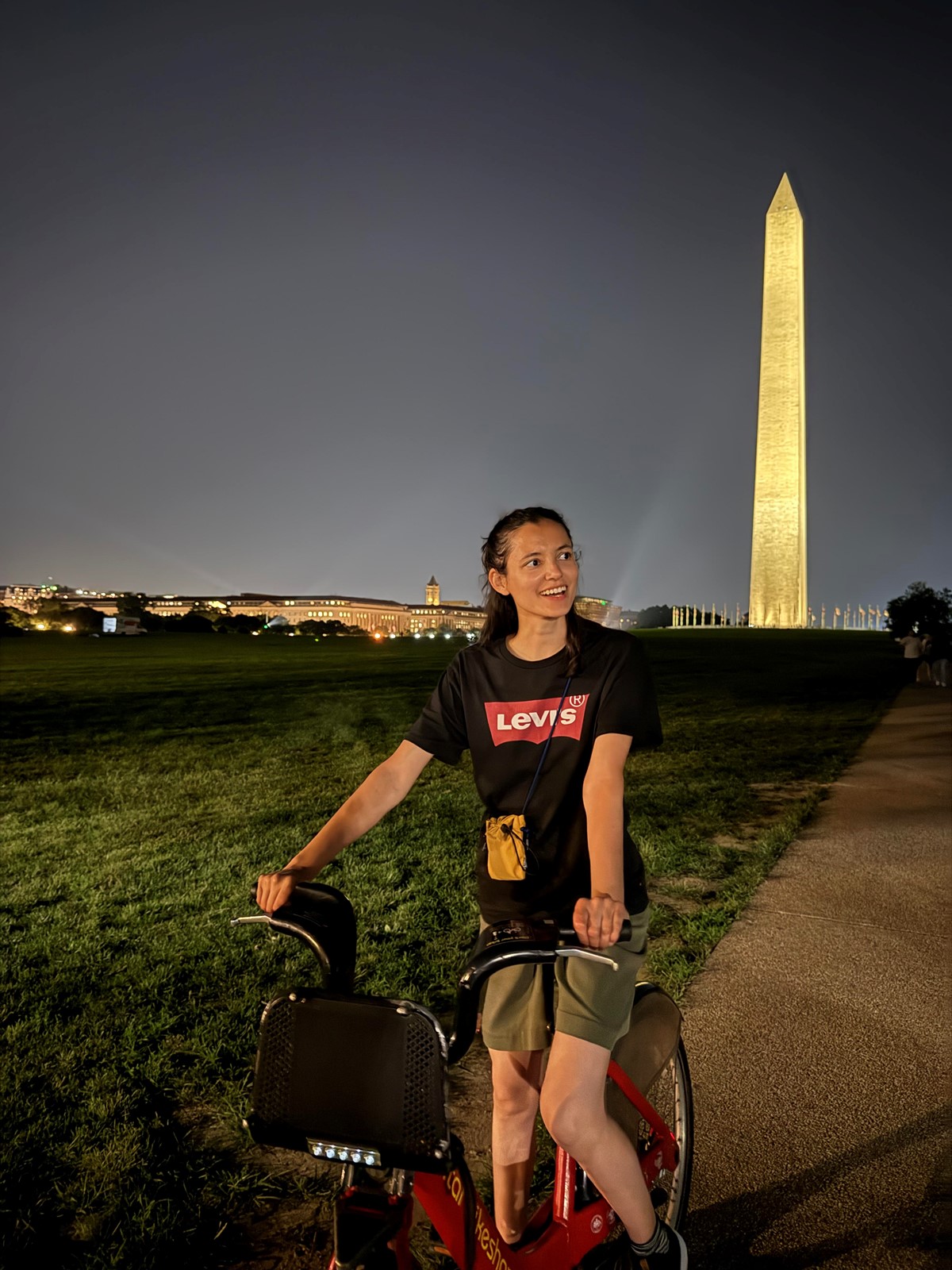

It doesn’t get much more patriotic than celebrating Independence Day at the nation’s capital. Our group spread blankets on the grass with a clear view of the Lincoln Memorial and the reflecting pool, just in front of the Washington Monument. One of my favorite rituals of the event is when the crowd seated on the steps of Lincoln shine their cell phone flashlights to the crowd near the monument and the crowd near the monument sends light back. It’s like a wave at a baseball game — collectively sharing joy of being American. E pluribus unum — and most wore T-shirts in red, white or blue.
Hours before the sky darkened for fireworks, our group had attended the parade, which was similar to many other parades I’ve seen in my lifetime, but somehow brighter and bigger because of the location. Old folks sat in lawn chairs and young children waved flags and corn dogs. People followed the road in convertibles and on floats towed by pickups. Proud parents on the sidelines yelled at their kids in the marching bands. From where we were seated, a few blocks from Seventh and Constitution, no one talked about politics nor were there mutters as a small group of protesters passed by. On this day, we were simply Americans, collectively getting a sunburn.
Members of our large group took turns guarding our blankets on the grass at the monument, and took turns visiting museums. At the National Gallery we occasionally Googled the price of the paintings to remind ourselves why the guards bark if you point your finger too close to Van Gogh’s paint globs.
“How can they let everyone in for free to these museums if the paintings cost so much?” asked Yelena, of Turkmenistan. Maybe that’s why she did not complain when she paid $8 for a hot dog at the museum cafe.
As we explored this and that in Washington D.C., I noticed many things about our country that I take for granted. For one thing, we’re fairly well organized. I’m an American, so I resented the inspection of my backpack when we went through the barricade that kept the flow of the crowds under control. However, with so many people in attendance it never felt like a mosh pit and no one poked me with a sharp object.
Trairat, of Thailand, said he was happy to see people in the parade of all shapes and sizes. Sometimes it is only the thinnest or most beautiful young people who are highlighted at big events, he said. Plenty of people were willing to take your money for slushies and deep-fried food (also so American), and the city had provided enough port-a-potties that you didn’t need to sprinkle the bushes or walk a mile to the nearest McDonald’s.
During the time with the participants in California, we had introduced them to the ideas that shape America, including equality, rule of law and the structures of government. This is good to know through lectures, but our participants started to notice small examples I would normally overlook. On the buses in Chico for example, several of the participants were surprised when the bus drivers lowered a ramp so people could board the bus by wheelchair. They also noticed the talking walk signs for the blind.
At the parade one of the participants pointed out that a trumpet player in the marching band was in a wheelchair and another person pushed him as he played. “That really says a lot,” our visiting educator said. “Americans don’t just talk about equality, you can see it right there.”
At the Capitol Building the prior day, we passed a man with a bullhorn who was shouting his opinion about the government. One in our group looked a little nervous. “Is he OK to do that? Will he be arrested?”
“Nope,” I replied. “You’ll see a protest here about something almost every day. This is a popular place to yell about things.”
When we took group pictures in front of the White House, we were curious what time they turn out the lights at night. I walked over to ask the policeman for information. One man was surprised. In his country the policemen are silent and he would never ask him a question.
It’s a big deal, apparently, that almost all Americans stop at red lights and will wait through that red light even if there are no cars in all directions. We also have trash cans on most streets in cities, and people use them most of the time.
A few things were noted that some of our visitors could live without. One Central European woman said she felt tormented by self-flushing toilets. Also, it’s difficult to know who to tip and who not to tip, and then there’s the explanation of how much.
I watched the news that night in the hotel room just a few blocks from the White House. It was estimated that 200,000 people had attended the fireworks that night. I know that there were many in the crowd who had vastly different opinions, and having different opinions is one of our rights. There is also a lot to collectively celebrate.


 PREVIOUS ARTICLE
PREVIOUS ARTICLE
